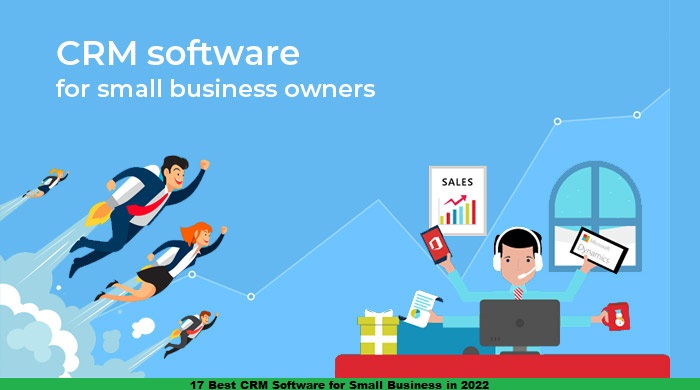As a business owner, you know how important it is to nurture new leads and strengthen relationships with the current client base, as this is how you grow your business! And good CRM software helps you achieve this. So, if you too are interested in trying out a CRM, here is a list of the 17 best CRM software for Small Business (SMBs) in 2024.
What Is A CRM?
CRM stands for Customer Relationship Management Software. As is quite clear from the name, it helps you manage your customer relationships. So, why is this important, and how does a CRM achieve this?
First of all, as your customer relationships improve, you convert more leads into customers and existing customers into your brand advocates. With so much competition, sales nowadays are made depending on the trust you instill and the brand’s perception in the minds of customers. A CRM helps you achieve this.
So, how does it exactly does this magic?
Its many features make this possible:
#1: It improves data organization
You can upload all your contacts, leads, and customers in the CRM. Now, track the journey of each of your leads becoming a customer and customer becoming a loyal advocate. It is also easier to analyze how many leads got converted and so on.
#2: Enhanced Communication
A CRM also manages the appointments of your salesmen. A good CRM will send a notification reminder to your salesperson before the appointment.
Also, CRMs have email templates you can use to streamline communication. All your employees can use a standard email template to maintain the brand image.
#3: Share Sales Info Selectively
CRM allows you to share your sales data, like the details of the customers, their journey, salesperson’s targets, etc., with your sales team. And you can decide how much each of them has access to.
#4: Know Your Numbers
Last but not least, it shows each of your salesperson their targets and how much they have achieved so far. Being able to access these numbers gives them the motivation to realize their targets.
Also read: What is a CDN and What are The Benefits of CDN (Content Delivery Network)
Also, the team lead can analyze the numbers and take measures accordingly.
There is a lot a CRM can do for a small business. Many businesses have reported a tremendous improvement in their follow-ups and thus healthier customer relationships.
Which CRM Is Good For Me?
There is an ocean of CRM software available. And finding the right one is like trying to find a needle in the haystack. But here are a few questions you might ask yourself to try to understand your requirements.
Question 1: Is the software easy to understand and use?
In practical terms, you won’t use software that isn’t easy to use and thus would not reap any benefits out of it.
Question 2: Is the software cloud-based?
Your sales team should be able to access the data through any device, be it their laptop, smartphone, or anything else.
Question 3: Does it maintains a profile of every lead separately?
The software should maintain a profile complete with name, email, phone number, social profile links, etc. This will enable you to contact the person when needed and analyze whether the person fits your buyer persona.
Question 4: Does it allows you to control which data is shared and which is not?
If you hire salespersons, then you should be able to control which data can be accessed and which not
Question 5: Does the software allow pipeline management?
If you possess a sales team, you must have a sales pipeline that involves sending emails and maybe giving a welcome call, etc. Your software must prompt your sales team to act on these steps so that no step is missed and customer relationship improves.
These and many other questions together will help make your final decision. And to help you out, we have below a list of the 17 best CRM software for SMBs (Small Business).
Top 17 CRM Software For Small Business (SMBs) in 2024.
#1: Salesmate
Salesmate is an easily scalable and flexible choice that complements your business’s growth. Its USP is letting you make calls from within the system. You get a tool-free virtual phone number you can use to start calling your prospects and clients.
Why Salesmate?
- You can run your email campaign and analyze them within it.
- Prospect & lead engagement
- Sales pipeline & activity tracking
- Sales automation & sequences, etc.
- Easily sync with Google apps
- Sales forecasting
- Mobile app for iOS and Android
- Integration with Gmail, Drive, Zapier, RingCentral, Wufoo, Slack, PieSync, ClearBit, etc.
- Shared team inbox somewhat like Whatsapp groups
Pricing: Starts at $12/user/month
#2: Insightly
This CRM works best if you have a multi-level organization. It focuses on managing your projects and tasks better with the help of its built-in project management and delivery system.
Why Insightly?
- Lead tracking and routing
- Workflow automation
- Project management and delivery
- Tracks emails
- It has a mobile app for both iOS and Android
- Flaunts integrations with 25+ tools
- And you can still build and deploy custom apps
#3: Pipedrive
Pipedrive is with you as you scale and grow your business to new heights. It has 100+ integrations to help your business as it gets more complex.
But as the name says, its USP is pipeline management. So, if that is your primary requirement, go for Pipedrive.
Why Pipedrive?
- Pipeline management
- Activity and goal tracking
- Sales reporting and forecasting so that you know the numbers
- Mobile app to use across iOS and Android
- Workflow automation
- 100+ integrations like email, Plecto, Toky, Pipechimp, GetAccept, and so on.
#4: HubSpot
Hubspot is one of the best CRM software for Small Business (SMBs). And its mantra is, ‘pay for what you need.’ So, it has a free version and a paid version. The free version is sufficient for small businesses, while you can scale to the paid version as per your needs.
Why HubSpot?
- Marketing automation
- Social media and SEO strategy tools
- Blog and content optimization
- Email tracking
- Team email
- Email signature
- Live chat
- Gmail and Outlook integrations
- Predictive lead scoring
- Recurring revenue tracking
- A/B Testing
#5: Freshworks
Freshworks, also previously called Freshsales, identifies your websites visitors and adds them as sales lead to the CRM software. It also groups them in different customized pipelines. Now, you can assign these leads to the right sales reps and enjoy conversions!
Why Freshworks?
- Built-in calling system like Salesmate
- Real-time track of visitors
- Lead scoring and assignment
- Visual sales pipeline and deal management
- Contact management
- Email sync and tracking
- Smart analytics and forecasting
#6: Salesforce
Salesforce is by far one of the most popular CRMs out there. Though it is more common with larger enterprises, it also has a lighter version called Lightning Essentials Package.
Why Salesforce?
- Contact management system
- Workflow automation
- Lead management
- Opportunity management for more conversion
- Email integrations
- Data management platform
- Google marketing platform
- Sales forecasting and analysis
- Email integrations
#7: Zoho
Zoho is again one of the best CRM software for Small Business (SMBs) that is mainly attached to big enterprises. But like Salesforce, it has simpler versions too, and the lowest one is free! And you should choose Zoho if your priority is lead management.
Why Zoho?
- Combine all your channels and have one organized environment
- Generate leads through connecting social accounts
- Live chat with website visitors and also visitor tracking
- Intelligent sales analytics and forecasting
- Zia AI, a part of Zoho, analyses data to give insights about trends, conversions, and deal closings
- Customization capabilities
#8: Salesflare
Salesflare is for you if you are a small to medium-sized B2B. And do you know the best part? You do not need to fill it up. It fills for itself, automatically!
Why Salesflare?
- Automatic contact management, i.e., info is gathered from public sources
- It records meetings and calls
- It automatically sorts and tracks files exchanged with customers
- Displays sales opportunities
- Auto-generated to-do lists.
#9: Agile CRM
You must have heard; God is in the details. Agile CRM is one CRM software that takes these details seriously. It has features for the minor task like document signing to biggies like marketing automation.
Also read: The Best 5 CRM Software for Small Business in 2024
But that is the problem as well. You have to pay for so many unnecessary features, and things get complex too. But some good news is that it is free for up to 10 users.
Why Agile CRM?
- 360 Degree customer view and contact management
- Built-in calling
- Workflow automation
- Allows making landing pages
- Track deals and set milestones
- Schedules appointments
- Email marketing and tracking
- Connects with social channels
#10: Capsule CRM
Capsule CRM is one of the best CRM software for SMBs (Small Business). It is ideal for lead assignments and team management. It gives a lot of importance to easy UI, sales pipeline, and tracking relationships. But lacks in campaigns and reporting.
Why Capsule?
- Sales pipeline management
- Organizes history, tasks, documents, and details of the contacts in a single place
- Task management
- Track sales performance and team performance
- Sales forecasting and analysis.
#11: Microsoft Dynamics 365
Microsoft’s Dynamics 360 is indeed a 360-degree coverage of sales and marketing team tasks. Its focus is on lead generation and sales forecasting.
Why Microsoft Dynamics 365?
- Sales forecasting and analysis
- Integrations with LinkedIn Sales Navigator, LinkedIn, Outlook, and many other Microsoft apps
- Sales productivity tools
- AI-driven sales insights that help boost sales
#12: Zendesk Sell
Zendesk sells focuses its operations on sales automation primarily. But it also gives priority to lead prioritization so that you convert more leads and have more sales.
Why Zendesk Sell?
- Contact management system
- Built-in calling and SMS
- Track emails
- Flaunts its integrations with Dropbox, Slack, MailChimp, Google Suit, etc.
#13: Copper
Like the G-Suit apps, Copper CRM is great if you want more productivity and task automation. How task automation? It reduces the need for manual data entry and increases productivity.
Why Copper CRM?
- Automatic data fetching for more productivity
- Contact management system
- Lead management
- Workflow automation
- Visual pipeline management
- Task management and alerts
- Sales forecasting reports and insights
- Integration with G-Suite, Zendesk, RingCentral, Xero, etc.
#14: Streak
Streak is one of a kind CRM. It operates from within Gmail. This means that you will find it easier to learn as you are already familiar with Gmail.
Why Streak?
- Contact management
- Deal management from within Gmail
- Task management and reminders
- Email tracking and bulk emailing
- Shows data with very interactive visuals
- Works on smartphones
#15: Sugar CRM
Sugar CRM mainly concentrates on sales and marketing insights and analytics, and sales forecasting. But it is a complete solution for Small Business (SMBs) and big enterprises. It has two modules, Sugar Professional for Small Business (SMBs) and Sugar Market for huge enterprises.
Why Sugar CRM?
- Insights and analytics on sales and marketing
- Sales forecasting
- Workflow automation
- Quotes management
- Easily customizable by users
- Has mobile apps too
- Connects social channels
- Manages marketing campaigns
- Project management
- Sales lead management
#16: Nimble
Nimble is an affordable CRM that helps you in pipeline management. Also, it has the very cool ‘Rules Engine,’ which allows predicting contacts and activities that match your behavior. And once you engage, it reminds you to stay in touch with them.
Why Nimble?
- Deal pipeline management
- Sales forecasting and analysis
- Contact management
- Message inbox and group messaging
- Provides email templates to maintain standards
- Email sync and tracking
- Activity and task management
#17: AmoCRM
AmoCRM is a CRM with a social twist. It merges all the channels, and you can check messages all at once. It is the best CRM for businesses that involve a lot of social media interactions.
Why AmoCRM?
- Keep a check on sales progress
- It tracks and helps nurture leads
- Manages tasks and notifications
- Smart sales analytics
- VoIP integrated calling
- Displays targeted ads
- It has a mobile app too.
Conclusion
In a nutshell, CRM is an excellent tool for achieving growth. But which CRM will help you achieve it depends on your needs, organization structure, number of employees, budget, etc.
Also read: A comprehensive list of 9 Best CRM Companies in the USA in 2024
So, these were our 17 best CRM software for (SMBs) Small Business. We hope you liked them. If you have any doubts or suggestions regarding any of the CRM, please drop a comment below. We will reply ASAP! Also, tell us which CRM did you find the most useful!







